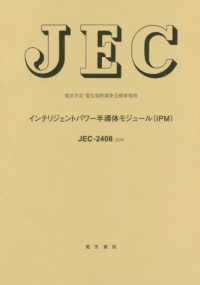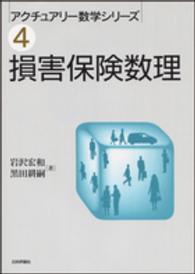- ホーム
- > 洋書
- > 英文書
- > Business / Economics
Full Description
Despite impressive economic growth rates over the last decade, foreign aid still plays a significant role in Africa's political economies. This book asks when, why, and how foreign aid has facilitated, or hindered, democratization in sub-Saharan Africa. Instead of looking at foreign aid as a monolithic resource, the book examines the disparate impacts of aid specifically intended for development outcomes and aid explicitly aimed at democracy promotion. Careful attention is also given to examining the role of various aid modalities, including general budget support, and the influence of non-traditional donors. In doing so, the authors use a combination of cross-country quantitative analyses and in-depth case studies of Benin, Ghana, Malawi, Mali, Mozambique, Tanzania, and Zambia based on recent interviews with donors, government officials, and civil society organizations. Unlike other work on aid and democracy, the book carefully considers how foreign aid affects various elements of the democratization process, including transitions to multiparty systems and democratic consolidation. In terms of the latter, the authors analyse what role different types of aid play in avoiding a breakdown of multiparty democracy or an erosion of civil liberties, reinforcing parliaments and judiciaries, promoting free and fair elections and a vibrant civil society, and encouraging competitive party systems. Overall, the authors' findings suggest that the best means for enhancing the effectiveness of aid for development outcomes is not always the most optimal way of promoting democratic consolidation, and the book provides policy recommendations to try and reconcile these trade-offs.
Contents
1. Introduction: Why Aid and Democracy? Why Africa? ; 2. Democratization in Africa: What Role for External Actors? ; 3. Foreign Aid and Democratic Development in Africa ; 4. Foreign Aid in Dangerous Places: The Donors and Mali's Democracy ; 5. Two Steps Forward, One Step Back: The Limits of Foreign Aid on Malawi's Democratic Consolidation ; 6. The Changing Dynamics of Foreign Aid and Democracy in Mozambique ; 7. Donor Assistance and Political Reform in Tanzania ; 8. Foreign Aid and Democratic Consolidation in Zambia ; 9. Beyond Electoral Democracy: Foreign Aid and the Challenge of Deepening Democracy in Benin ; 10. Ghana: The Limits of External Democracy Assistance ; 11. Conclusions and Policy Recommendations








